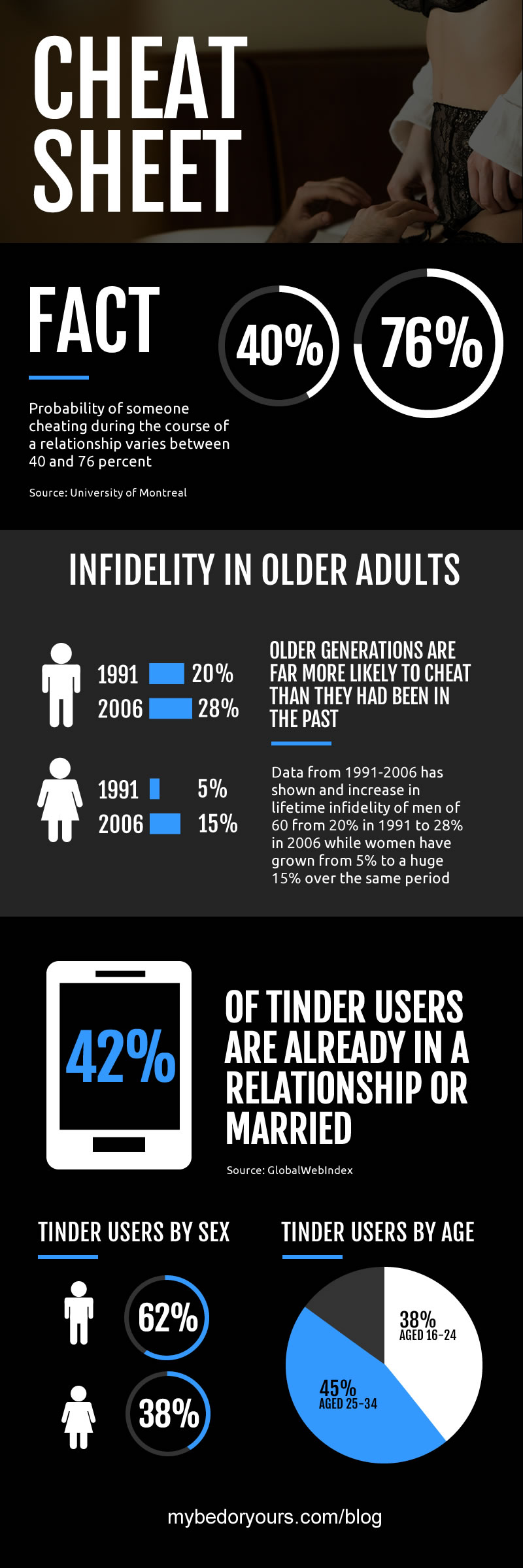UPDATED 31st August 2022
40%. 76%. According to Ph.D. student Geneviève Beaulieu-Pelletier, somewhere between those two numbers is where you can expect the probability that there is infidelity in your relationship.
Her findings are motivated by two studies which were recently conducted by the University of Montreal. The first focused on infidelity in subjects age 23 and under. The study concluded that 41% of participants had cheated, whereas a staggering 68% had considered cheating.
The second study was identical in design but focused on subjects age 27 and under. The numbers were similar, with 39% having cheated while 54% had considered it.
Is it just young people who are being unfaithful? Is that infidelity tied to the rise of the internet and hook-up culture, thanks to apps like Tinder or Bumble?
Not exactly. Let’s explore.
Infidelity in Older Adults
In fact, it appears that older generations are also far more likely to cheat now than they have been in the past. Data from 1991-2006 has shown an increase in lifetime infidelity of men over 60 from 20% in 1991 to 28% in 2006.
For women over 60, the change is even more polarizing. Lifetime rates of infidelity have ballooned to 15%, up from 5% during the same period. It’s fair to assume that those numbers have continued their upward trend over the past 10+ years, as well.
The Role of Hook Up Culture in Infidelity
While we certainly cannot attribute the rise of infidelity exclusively to dating apps and the rise of hookup culture, they aren’t blameless either. According to research firm GWI, 42% of Tinder users are already in a relationship or married. Of course, these people aren’t cheating because of dating apps, but their wide availability certainly makes it easier than ever to cheat.
Global Comparisons
Many of the studies available focus on infidelity in North America, but infidelity is far from an American phenomenon. Take Japan for example, where infidelity has risen at an alarming rate.
A recent survey by the Ministry of Health found that 1 in 5 Japanese men age 16-49 are guilty of adultery, while just over 1 in 10 Japanese women are guilty. Ashley Madison, the famed hookup site for married people recently launched in Japan, perhaps in part due to the findings above. Within the first ten days, 120,000 Japanese people had made profiles on the site, with women outnumbering men by 2 to 1.
It isn’t just the Japanese and Americans who are engaging in infidelity, either. Data recently garnered from the Ashley Madison database shows that this hookup site for married people has a strong following in South America, India, and Scandinavian countries as well. In other words, infidelity is very much a global issue.
Five Myths About Infidelity
Considering that infidelity is such a hot-button issue, it’s no surprise that there are misinformation and myths abound. Let’s take a closer look at some of the most popular myths about cheating.
Affairs Are More Common Among the Rich
We often see rich and famous celebrities embroiled in scandals related to infidelity. But, just because we tend to hear about these stories more often, it doesn’t mean that infidelity is the domain of the rich and powerful. In fact, some studies suggest that women are more likely to cheat if they aren’t wealthy than they are if they are wealthy.
If You Cheat, You Aren’t in Love with Your Partner
Sadly, most people believe that cheating on your partner is a direct result of falling out of love with them. Overwhelmingly, this appears not to be the case. Surveys conducted on unfaithful men and women found that their reasons for cheating typically have much more to do with a desire to have sex with a person outside of their relationship than it does with falling out of love with their spouse.
We Agree on What Constitutes Cheating
These days, cheating isn’t nearly as black and white as it was in the past. Thanks to the internet, there are so many ways to express your sexual personality. Depending on whom you’re speaking to, cheating can be as black and white as a physical relationship with someone besides your partner, or it can be as gray as watching pornography or entering an elicit chat room.
Keeping Your Sex Life Exciting Prevents Infidelity
Another popular myth is that spicing up your sex life will prevent infidelity. In rare cases, this may be true. However, for the most part, if your significant other is predisposed to cheating, they’re going to do so regardless of how exciting your life is in the bedroom.
Married Couples Don’t Cheat
Quite the contrary. Considering the existence of sites like Ashley Madison, as well as data that confirms that many users of dating sites and apps are already in a committed relationship, there are no facts to back up the idea that marriage insulates couples from infidelity.
Psychology of Infidelity
When it comes to infidelity, there’s a broad range of potential causes, and they depend on the psychology of each person. In some cases, they can also depend on what’s lacking from a relationship.
Some simply have a predisposition to cheat because of mental factors such as narcissism or ego. Others cheat because they’re feeling a void within themselves or their relationship. What’s certain is that there are countless reasons that different individuals cheat, and these reasons are entirely dependent on the individual.
Cheating vs. Polyamory
The difference between cheating and polyamory is clear cut. In instances of cheating, someone steps outside of their relationship and has sexual or emotional relations with another person, all without the knowledge of their spouse. In most cases, the goal is to keep this affair completely secret from the other person in the relationship. This is typically thought of as devious, underhanded and careless.
On the other hand, is polyamory. With polyamory, both parties of the relationship are entirely aware of their partner’s infidelity. These relationships exist on the premise that it’s entirely alright to step outside of the relationship, provided that both parties are open and honest with each other throughout the process.
While both situations are examples of infidelity, cheating can be much more destructive to a relationship than polyamory.
Having Your Cake and Eating It, Too – The Benefits of Infidelity in Monogamous and Polyamorous Relationships
Some people don’t view infidelity as the Scarlet Letter which it’s typically viewed as in society. In fact, many believe that stepping outside of your relationship is a way to improve the bond between both parties.
At their best, our relationships with others provide us with a deeper understanding of ourselves, our own needs, and the needs of others. In the context of polyamory, the presence of additional relationships may make it easier to learn more about ourselves and others than we would be able to in a completely monogamous relationship.
On the other side of the coin, infidelity can have benefits to monogamous relationships as well. Those who have engaged in a relationship with someone who is unfaithful is more capable of understanding the warning signs of infidelity and how to avoid them in future relationships.
While it’s no fun to find out you’ve been a victim of infidelity, the perspective and clarity you may gain from that relationship can improve your ability to be in a monogamous relationship in the future.
Maintaining A Relationship After Infidelity
For some, learning of a partner’s infidelity is an automatic deal-breaker. It can be extremely difficult to regain the same level of love and trust you had previously had for your significant other after learning of their transgressions.
On the other hand, you may be open to the possibility of working through your issues, in the hope that your relationship can come out stronger on the other side.
This is possible. Here are some tips that can help you make it work with your partner if you’re interested in staying together.
- Communicate – Whether you’re the victim of infidelity, or you’re the one who has been unfaithful, strong communication is going to be key if you decide to work out your relationship. By focusing on strong communication, you’ll be better equipped to overcome this obstacle in your relationship and rebuild it stronger than it was in the past.
- Focus on building – Simply put, an affair divides couples. If you’re planning on staying together, you need to be on the same team. Focus on rebuilding your foundation together.
- Stay in the Moment – If you’re staying together, the past must remain the past. Too often, couples who have experienced infidelity in their relationships can’t survive long term because the victim of the infidelity is unable to forget what has happened in the past. If you’re looking to stay together, you must be able to move forward from what has happened in the past.
- Trust Your Instincts – Is staying together the right choice? If you believe in your heart that it is, trust that belief. Don’t second guess yourself.
- Respect Boundaries – If you’re the victim of infidelity in your relationship, and you’re trying to make it work, it’s important to remember that boundaries still do exist. Obviously, you may expect more transparency in your relationship. But, that doesn’t mean that your significant other is no longer entitled to privacy. Creating and respecting boundaries will give you a better chance of success if you decide to work it out with your partner.
Infographic

